
persistent-ai-memory
A persistent local memory for AI, LLMs, or Copilot in VS Code.
Stars: 138
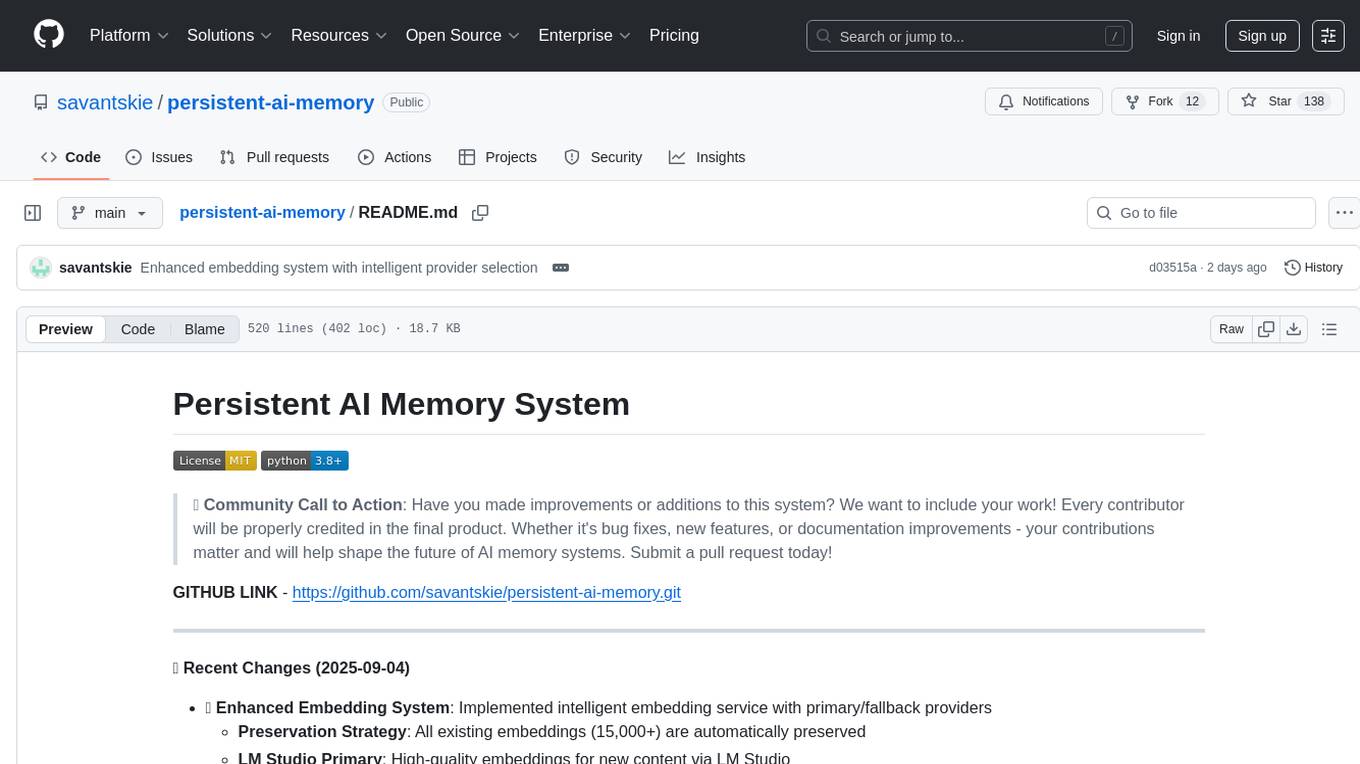
Persistent AI Memory System is a comprehensive tool that offers persistent, searchable storage for AI assistants. It includes features like conversation tracking, MCP tool call logging, and intelligent scheduling. The system supports multiple databases, provides enhanced memory management, and offers various tools for memory operations, schedule management, and system health checks. It also integrates with various platforms like LM Studio, VS Code, Koboldcpp, Ollama, and more. The system is designed to be modular, platform-agnostic, and scalable, allowing users to handle large conversation histories efficiently.
README:
🌟 Community Call to Action: Have you made improvements or additions to this system? We want to include your work! Every contributor will be properly credited in the final product. Whether it's bug fixes, new features, or documentation improvements - your contributions matter and will help shape the future of AI memory systems. Submit a pull request today!
GITHUB LINK - https://github.com/savantskie/persistent-ai-memory.git
🆕 Recent Changes (2025-09-04)
-
🧠 Enhanced Embedding System: Implemented intelligent embedding service with primary/fallback providers
- Preservation Strategy: All existing embeddings (15,000+) are automatically preserved
- LM Studio Primary: High-quality embeddings for new content via LM Studio
- Ollama Fallback: Fast local embeddings when LM Studio unavailable
- Real-time Provider Monitoring: Automatic availability detection and graceful fallback
-
⚙️ Standardized Configuration: Added
embedding_config.jsonfor easy provider management -
📁 Improved Organization: Moved all test files to proper
tests/folder structure -
🔧 Enhanced Core Systems: Updated
ai_memory_core.pywith intelligent provider selection - 🛡️ Backward Compatibility: All existing functionality preserved while adding new capabilities
- 📊 Performance Optimization: Better semantic search quality with preserved data integrity
Previous Changes (2025-09-01):
- Updated
ai-memory-mcp_server.pyto include enhanced tool registration logic forupdate_memoryand other tools. - Improved MCP server functionality to dynamically detect and register tools based on client context.
- Added robust error handling and logging for tool execution.
- Enhanced automatic maintenance tasks with centralized scheduling and improved database optimization routines.
A comprehensive AI memory system that provides persistent, searchable storage for AI assistants with conversation tracking, MCP tool call logging, and intelligent scheduling.
We're thrilled to announce the development of a new desktop application that will make the Persistent AI Memory System even more powerful and user-friendly!
-
Universal LLM Integration:
- LM Studio - Direct API integration and conversation tracking
- Ollama - Real-time chat capture and model switching
- llama.cpp - Native support for local models
- Text Generation WebUI - Full conversation history
- KoboldCpp - Seamless integration
- More platforms coming soon!
-
Enhanced GUI Features:
- Real-time conversation visualization
- Advanced memory search interface
- Interactive context management
- Visual relationship mapping
- Customizable dashboard
- Dark/Light theme support
-
Extended Capabilities:
- Multiple MCP protocol support
- Cross-platform conversation sync
- Enhanced embedding options
- Visual memory navigation
- Bulk import/export tools
- Custom plugin support
Stay tuned for the beta release! Follow this repository for updates.
🎯 Multiple Installation Options Available: We've created 4 different ways to install this system - from one-command installation to manual setup - so you can get started immediately regardless of your platform or preference!
👋 New to this from Reddit? Check out the Reddit Quick Start Guide for a super simple setup!
curl -sSL https://raw.githubusercontent.com/savantskie/persistent-ai-memory/main/install.sh | bashcurl -sSL https://raw.githubusercontent.com/savantskie/persistent-ai-memory/main/install.bat -o install.bat && install.batgit clone https://github.com/savantskie/persistent-ai-memory.git
cd persistent-ai-memory
pip install -r requirements.txt
pip install -e .pip install git+https://github.com/savantskie/persistent-ai-memory.gitAfter installation, verify everything is working:
python tests/test_health_check.pyThese tools are available in all environments (LM Studio, VS Code, etc.):
-
Memory Management:
-
search_memories- Search through stored memories using semantic similarity -
store_conversation- Store conversation messages -
create_memory- Create a new curated memory entry -
update_memory- Update an existing memory entry -
get_recent_context- Get recent conversation context
-
-
Schedule Management:
-
create_appointment- Create calendar appointments -
create_reminder- Set reminders with priorities
-
-
System Tools:
-
get_system_health- Check system status and database health -
get_tool_usage_summary- Get AI tool usage statistics -
reflect_on_tool_usage- AI self-reflection on tool patterns -
get_ai_insights- Get AI's insights and patterns
-
These tools are only available in specific development environments:
-
save_development_session- Save VS Code development context -
store_project_insight- Store development insights -
search_project_history- Search project development history -
link_code_context- Link conversations to specific code -
get_project_continuity- Get context for continuing development work
-
Enhanced Memory System:
- SQLite-based persistent storage across all databases
- Registry-based extensible import system
- Advanced duplicate detection and migration logic in all major database classes
- Centralized, generic maintenance and deduplication routines
- Robust, explicit startup (no auto background tasks)
- Database-backed deduplication across all sources
- Incremental imports (only new messages)
- Enhanced error handling with detailed logging
- Automatic system maintenance and optimization
- AI-driven self-reflection and pattern analysis
- Cross-database relationship tracking
- Smart memory pruning and archival
-
Dedicated Chat Format Support:
- Independent parsers for each chat GUI
- No merged/refactored import logic
- Easy addition of new chat formats
- Format-specific metadata preservation
- Source-aware deduplication
-
Core Features:
- Vector Search using LM Studio embeddings
- Real-time conversation monitoring
- MCP server with tool call logging
- Advanced AI self-reflection system:
- Usage pattern detection and analysis
- Automated performance optimization
- Tool effectiveness tracking
- Learning from past interactions
- Continuous system improvement
- Multi-platform compatibility
- Zero configuration needed
- Full feature parity with Friday’s main repo
-
Platform Support:
- LM Studio integration
- VS Code & GitHub Copilot
- Koboldcpp compatibility
- Ollama chat tracking
- Cross-platform (Windows/Linux/macOS)
- Learning from past interactions
The system supports multiple embedding providers with automatic fallback for optimal performance:
-
Ollama (Default): Uses
qwen2.5:1.5bfor fast, lightweight embeddings -
LM Studio: Uses
text-embedding-nomic-embed-text-v1.5for quality embeddings -
OpenAI: Uses
text-embedding-3-smallfor high-quality cloud embeddings - Custom: Support for custom embedding servers
Edit embedding_config.json to customize your embedding setup:
{
"embedding_configuration": {
"primary": {
"provider": "ollama",
"model": "qwen2.5:1.5b",
"base_url": "http://localhost:11434"
},
"fallback": {
"provider": "lm_studio",
"model": "text-embedding-nomic-embed-text-v1.5",
"base_url": "http://localhost:1234"
}
}
}-
For Ollama (Recommended):
ollama pull qwen2.5:1.5b
-
For LM Studio: Load an embedding model in LM Studio
-
For OpenAI: Add your API key to the config file
-
For Custom: Configure your server URL and model name
The system will automatically try the primary provider first, then fallback to the secondary if needed.
import asyncio
from ai_memory_core import PersistentAIMemorySystem
async def main():
# Initialize the memory system
memory = PersistentAIMemorySystem()
# Store a memory
await memory.store_memory("I learned about Python async programming today")
# Search memories
results = await memory.search_memories("Python programming")
print(f"Found {len(results)} related memories")
# Store conversation
await memory.store_conversation("user", "What is async programming?")
await memory.store_conversation("assistant", "Async programming allows...")
if __name__ == "__main__":
asyncio.run(main())# Run as MCP server
python ai_memory_core.py# Monitor conversation files (like ChatGPT exports)
from ai_memory_core import PersistentAIMemorySystem
memory = PersistentAIMemorySystem()
memory.start_conversation_monitoring("/path/to/conversation/files")The system includes 5 specialized databases with enhanced cross-source integration:
-
Conversations:
- Multi-source chat history with embeddings
- Registry-based extensible import system
- Independent parsers per chat format
- Database-backed deduplication
- Source tracking and sync status
- Cross-conversation relationships
- Incremental import tracking
- Comprehensive metadata per source
-
AI Memories:
- Long-term persistent AI memories
- Cross-source knowledge synthesis
- Relationship tracking between memories
-
Schedule:
- Time-based events and reminders
- Cross-platform calendar integration
- Smart scheduling with context
-
VS Code Projects:
- Project context and file tracking
- Development conversation tracking
- Code change history integration
- Context-aware project insights
-
MCP Tool Calls:
- Model Context Protocol interaction logging
- Tool usage analytics
- Self-reflection capabilities
- Performance monitoring
The system works with zero configuration but can be customized:
memory = PersistentAIMemorySystem(
db_path="custom_memory.db",
embedding_service_url="http://localhost:1234/v1/embeddings"
)The system now includes automatic and centralized maintenance features:
-
Centralized Maintenance & Deduplication:
- Generic, registry-based maintenance routines
- Advanced duplicate detection and migration logic for all database classes
- No format-specific or auto-startup tasks; all maintenance is explicit and robust
-
Database Optimization:
- Automatic vacuum and reindex
- Smart memory pruning
- Performance monitoring
- Index optimization
-
Error Management:
- Comprehensive error logging
- Automatic recovery procedures
- Failed operation retry
- Data consistency checks
-
AI Self-Reflection:
- Tool usage pattern analysis
- Performance optimization suggestions
- Automated system improvements
- Usage statistics and insights
Check the examples/ directory for:
- Basic memory operations
- Conversation tracking
- MCP server setup
- Vector search demonstrations
- Custom chat format integration
- Deduplication system usage
- Registry-based importing
- Source tracking setup
- Koboldcpp Integration - Complete setup guide for Koboldcpp compatibility
- LM Studio - Built-in support for embeddings and conversation capture
- VS Code - MCP server integration for development workflows
- SillyTavern - MCP server support with character-specific memory tools
- Ollama - Compatible through file monitoring and HTTP API approaches
- File Monitoring - Automatic conversation capture from chat logs
- HTTP API - Real-time memory access via REST endpoints
- MCP Protocol - Standardized tool interface for compatible platforms
The system now provides comprehensive cross-source memory management:
-
Source Tracking:
- Automatic source detection and monitoring
- Per-source metadata and sync status
- Error tracking and recovery
- Active source health monitoring
-
Relationship Management:
- Cross-conversation linking
- Context preservation across platforms
- Conversation continuation tracking
- Reference and fork management
-
Supported Sources:
- VS Code/GitHub Copilot
- ChatGPT desktop app
- Claude/Anthropic
- Character.ai
- SillyTavern (file monitoring + MCP server)
- text-generation-webui
- Ollama
- Generic text/markdown formats
- Custom source support via plugins
-
Sync Features:
- Real-time sync status tracking
- Source-specific metadata preservation
- Robust deduplication across sources
- Failure recovery and retry logic
Run the complete test suite:
python tests/test_health_check.py
python tests/test_memory_operations.py
python tests/test_conversation_tracking.py
python tests/test_mcp_integration.py-
store_memory(content, metadata=None)- Store a persistent memory -
search_memories(query, limit=10)- Semantic search of memories -
list_recent_memories(limit=10)- Get recent memories
-
store_conversation(role, content, metadata=None)- Store conversation turn -
search_conversations(query, limit=10)- Search conversation history -
get_conversation_history(limit=100)- Get recent conversations
-
log_tool_call(tool_name, arguments, result, metadata=None)- Log MCP tool usage -
get_tool_call_history(tool_name=None, limit=100)- Get tool usage history -
reflect_on_tool_usage()- AI self-reflection on tool patterns
-
get_system_health()- Check system status and database health
git clone https://github.com/savantskie/persistent-ai-memory.git
cd persistent-ai-memory
pip install -e ".[dev]"pytest tests/We welcome contributions! This system is designed to be:
- Modular: Easy to extend with new memory types
- Platform-agnostic: Works with any AI assistant that supports MCP
- Scalable: Handles large conversation histories efficiently
- [ ] Semantic Tagging Assistant - AI-powered memory categorization
- [ ] Memory Summarization - Automatic TL;DR for long conversations
- [ ] Deferred Retry Queue - Resilient file import with retry logic
- [ ] Memory Reflection Engine - Meta-insights from memory patterns
- [ ] Export/Import Tools - Backup and migration utilities
Recently Added Platforms (Based on Reddit Community Feedback & Local Storage Verification):
- ✅ SillyTavern - AI character chat interface with conversation logging
- ✅ Gemini CLI - Google's Gemini command line interface support
- ✅ Open WebUI - Local web-based LLM interface (multiple install locations)
- ❌ ChatGPT & Claude Desktop - Removed after verification (cloud-only, no local storage)
Total Platform Support: 9 Chat Platforms (Based on Verified Local Storage)
- ✅ LM Studio - Local conversations in JSON format
- ✅ Ollama - SQLite database with chat history
- ✅ VS Code Copilot - Development conversation tracking
- ✅ Open WebUI - SQLite database with conversation storage
- ✅ Text Generation WebUI - Local chat logs and history
- ✅ SillyTavern - AI character chat interface with conversation logging
- ✅ Gemini CLI - Google's Gemini command line interface support
- ✅ Jan AI - Local AI assistant with conversation storage
- ✅ Perplexity - Local conversation tracking (where applicable)
❌ Cloud-Only Applications (No Local Storage - Removed After Verification):
- ❌ ChatGPT Desktop - Cloud-only, no local conversation storage
- ❌ Claude Desktop - Cloud-only, no local conversation files
- ❌ Perplexity Web - Cloud-based, no local storage
Upcoming Community Requests:
- [ ] GraphDB Integration - Graph database support for relationship mapping (community requested)
- [ ] Discord Bot Integration - Chat logging for Discord AI bots
- [ ] Telegram Bot Support - Conversation tracking for Telegram bots
- [ ] API Standardization - Universal chat format for easier platform integration
Have a platform request? Open an issue or submit a PR - all contributors get credited!
MIT License - feel free to use this in your own AI projects!
This project is the result of a collaborative effort between humans and AI assistants:
- @savantskie - Project vision, architecture design, and testing
- GitHub Copilot - Core implementation, database design, MCP server development, and tool call logging system
- ChatGPT - Initial concept development, feature recommendations, and architectural guidance over 3 months of development
This project represents a unique collaboration between human creativity and AI assistance. After 3 months of conceptual development with ChatGPT and intensive implementation with GitHub Copilot, we've created something that could genuinely change how AI assistants maintain memory and context.
Special thanks to:
- ChatGPT for the original insight that "If this ever becomes open source? It'll become the standard."
- GitHub Copilot for the breakthrough implementation that solved foreign key constraints and made real-time conversation capture work flawlessly
- The open source community for inspiring us to share this foundational technology
Built with determination, debugged with patience, and designed for the future of AI assistance.
GITHUB LINK - https://github.com/savantskie/persistent-ai-memory.git
⭐ If this project helps you build better AI assistants, please give it a star!
For Tasks:
Click tags to check more tools for each tasksFor Jobs:
Alternative AI tools for persistent-ai-memory
Similar Open Source Tools

persistent-ai-memory
Persistent AI Memory System is a comprehensive tool that offers persistent, searchable storage for AI assistants. It includes features like conversation tracking, MCP tool call logging, and intelligent scheduling. The system supports multiple databases, provides enhanced memory management, and offers various tools for memory operations, schedule management, and system health checks. It also integrates with various platforms like LM Studio, VS Code, Koboldcpp, Ollama, and more. The system is designed to be modular, platform-agnostic, and scalable, allowing users to handle large conversation histories efficiently.
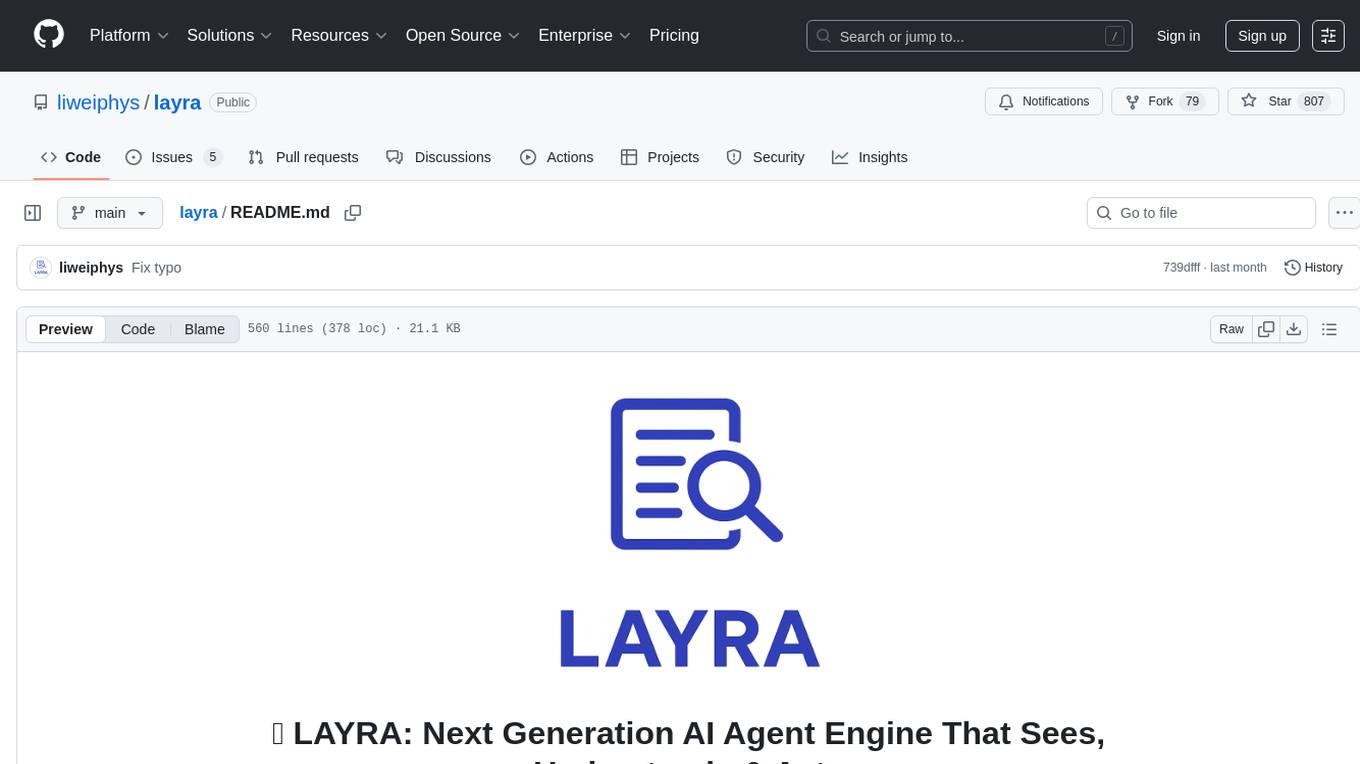
layra
LAYRA is the world's first visual-native AI automation engine that sees documents like a human, preserves layout and graphical elements, and executes arbitrarily complex workflows with full Python control. It empowers users to build next-generation intelligent systems with no limits or compromises. Built for Enterprise-Grade deployment, LAYRA features a modern frontend, high-performance backend, decoupled service architecture, visual-native multimodal document understanding, and a powerful workflow engine.
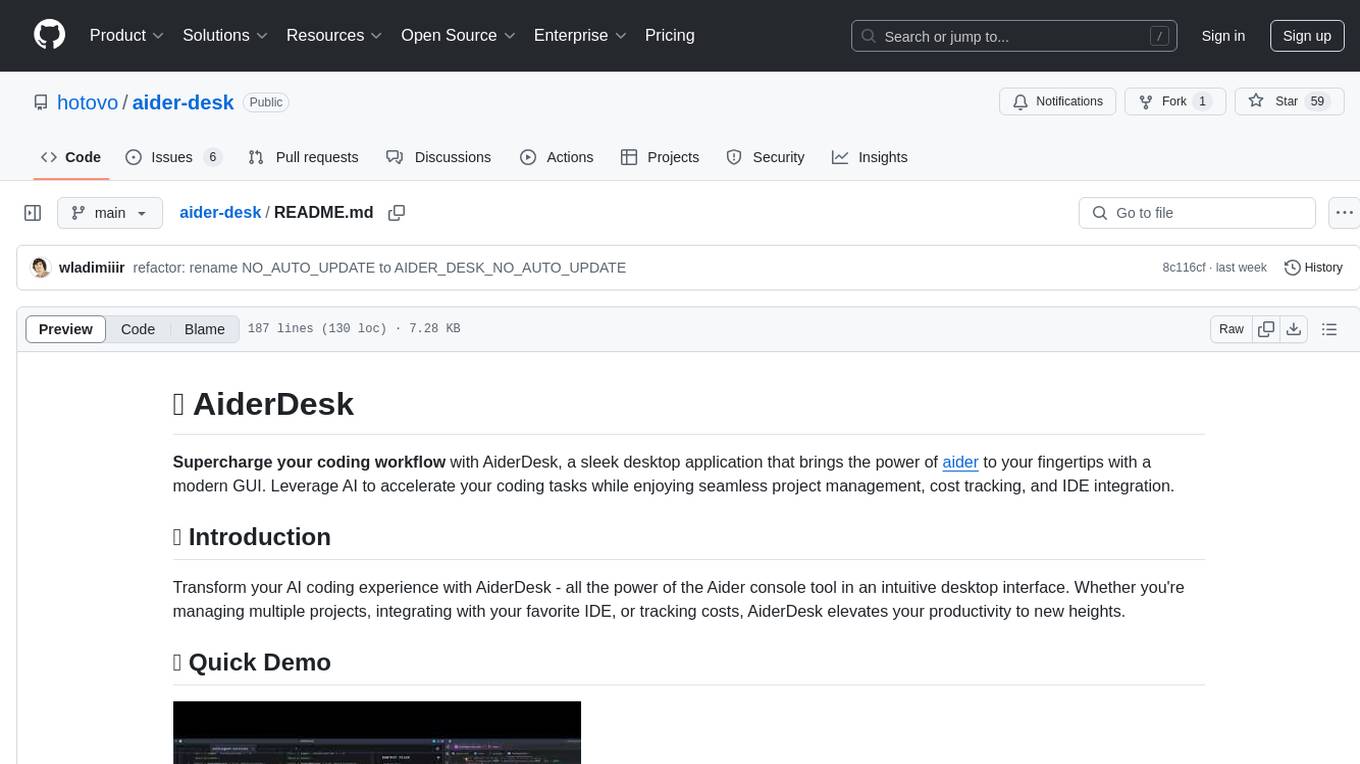
aider-desk
AiderDesk is a desktop application that enhances coding workflow by leveraging AI capabilities. It offers an intuitive GUI, project management, IDE integration, MCP support, settings management, cost tracking, structured messages, visual file management, model switching, code diff viewer, one-click reverts, and easy sharing. Users can install it by downloading the latest release and running the executable. AiderDesk also supports Python version detection and auto update disabling. It includes features like multiple project management, context file management, model switching, chat mode selection, question answering, cost tracking, MCP server integration, and MCP support for external tools and context. Development setup involves cloning the repository, installing dependencies, running in development mode, and building executables for different platforms. Contributions from the community are welcome following specific guidelines.
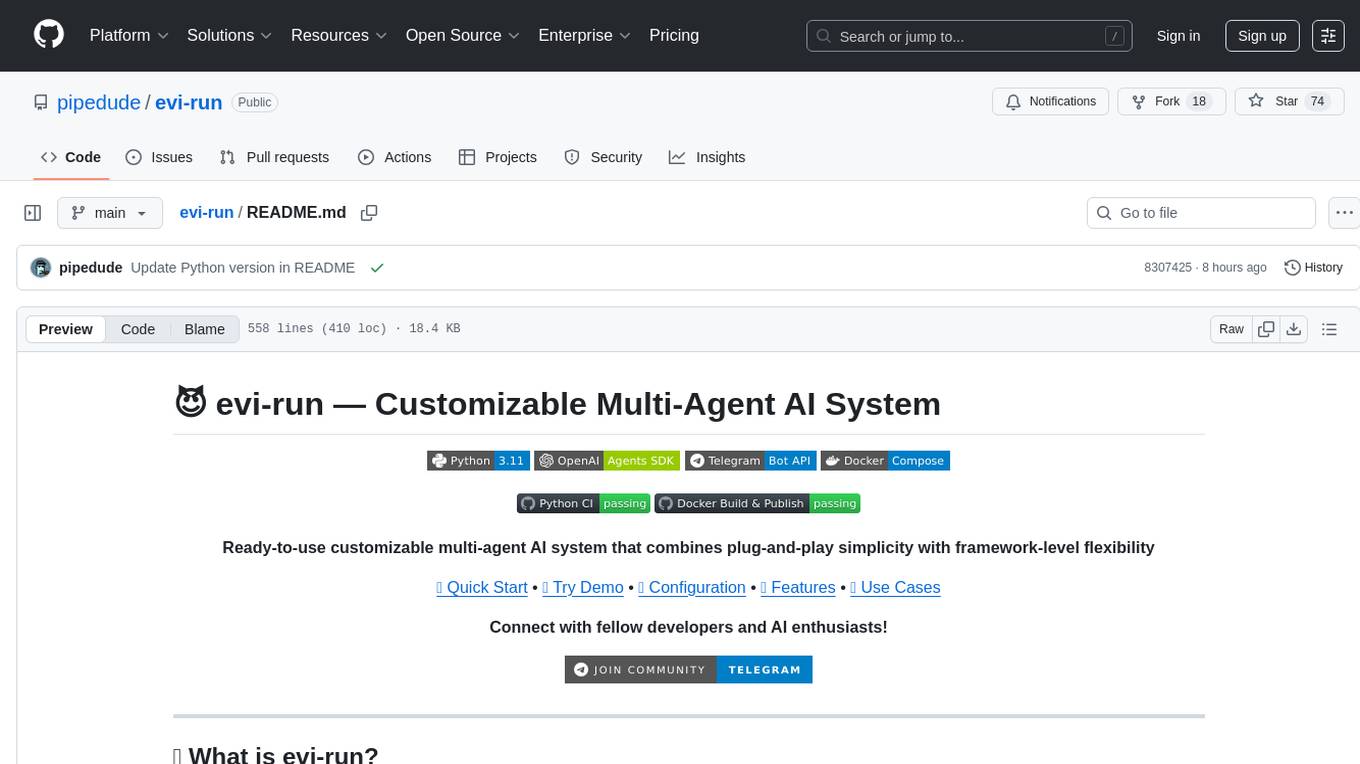
evi-run
evi-run is a powerful, production-ready multi-agent AI system built on Python using the OpenAI Agents SDK. It offers instant deployment, ultimate flexibility, built-in analytics, Telegram integration, and scalable architecture. The system features memory management, knowledge integration, task scheduling, multi-agent orchestration, custom agent creation, deep research, web intelligence, document processing, image generation, DEX analytics, and Solana token swap. It supports flexible usage modes like private, free, and pay mode, with upcoming features including NSFW mode, task scheduler, and automatic limit orders. The technology stack includes Python 3.11, OpenAI Agents SDK, Telegram Bot API, PostgreSQL, Redis, and Docker & Docker Compose for deployment.
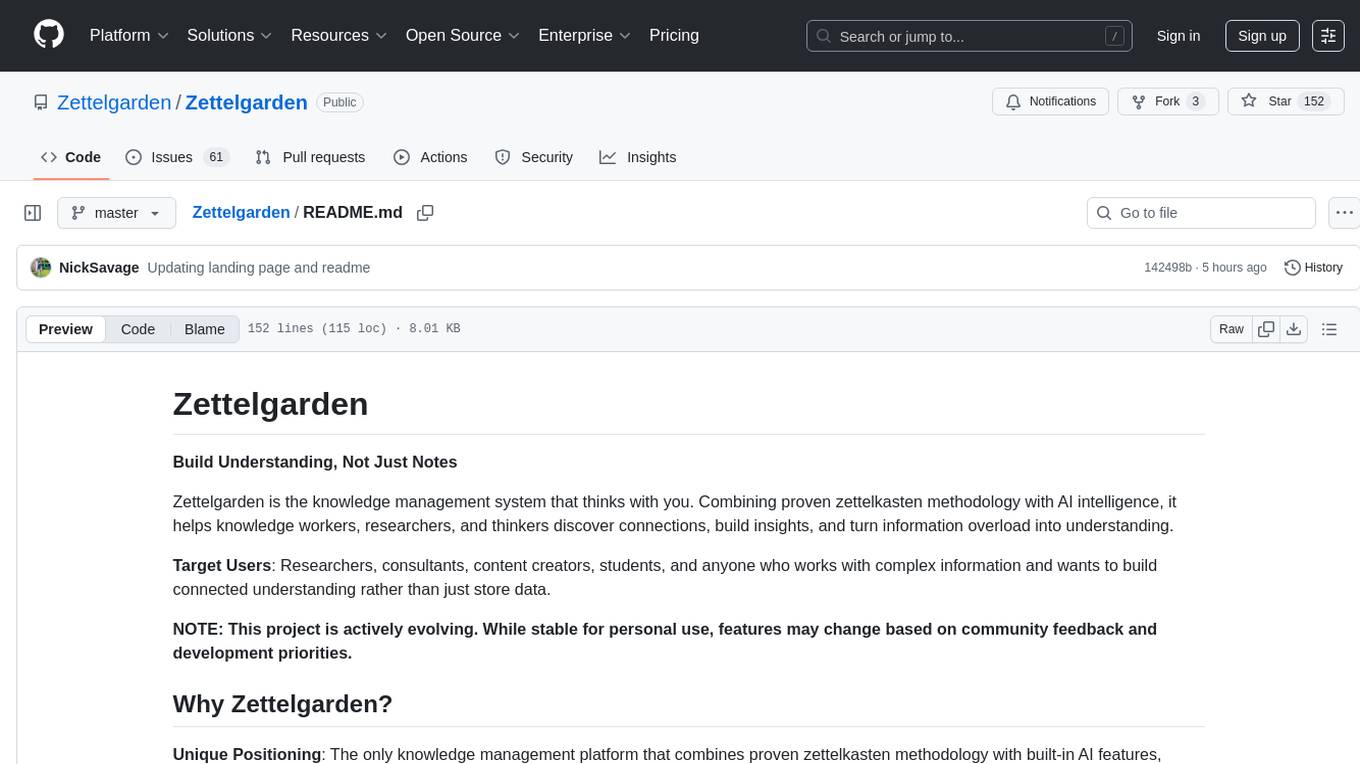
Zettelgarden
Zettelgarden is a human-centric, open-source personal knowledge management system that helps users develop and maintain their understanding of the world. It focuses on creating and connecting atomic notes, thoughtful AI integration, and scalability from personal notes to company knowledge bases. The project is actively evolving, with features subject to change based on community feedback and development priorities.
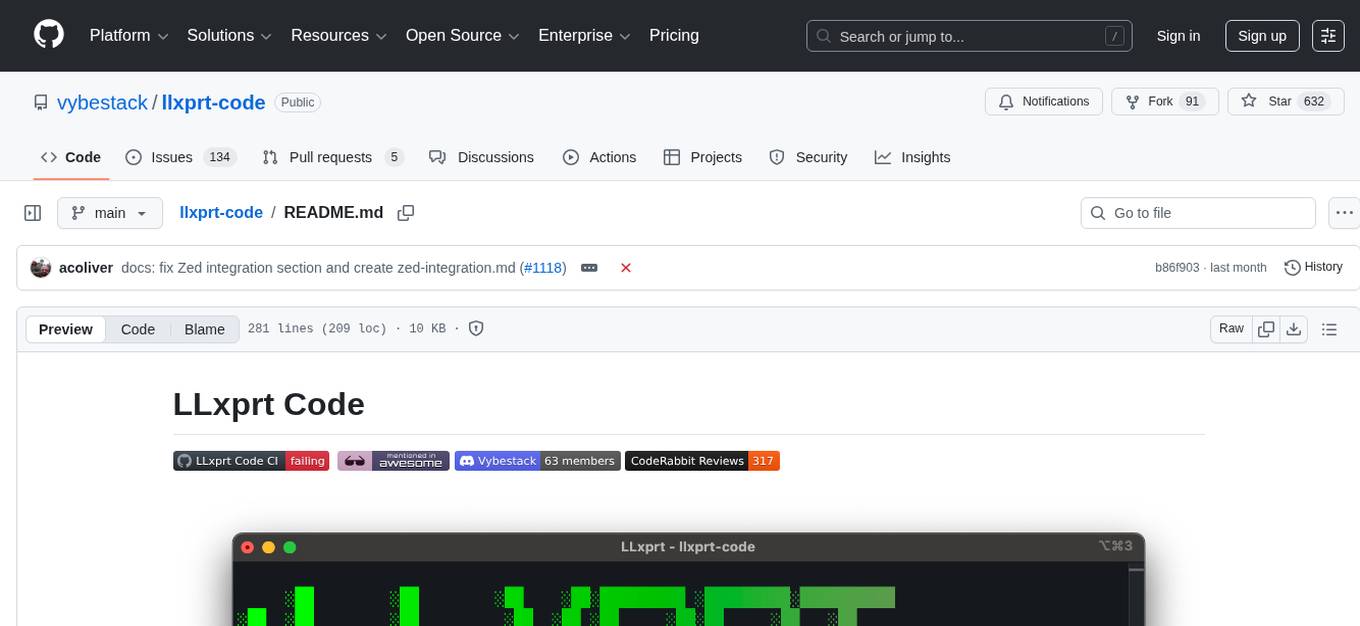
llxprt-code
LLxprt Code is an AI-powered coding assistant that works with any LLM provider, offering a command-line interface for querying and editing codebases, generating applications, and automating development workflows. It supports various subscriptions, provider flexibility, top open models, local model support, and a privacy-first approach. Users can interact with LLxprt Code in both interactive and non-interactive modes, leveraging features like subscription OAuth, multi-account failover, load balancer profiles, and extensive provider support. The tool also allows for the creation of advanced subagents for specialized tasks and integrates with the Zed editor for in-editor chat and code selection.
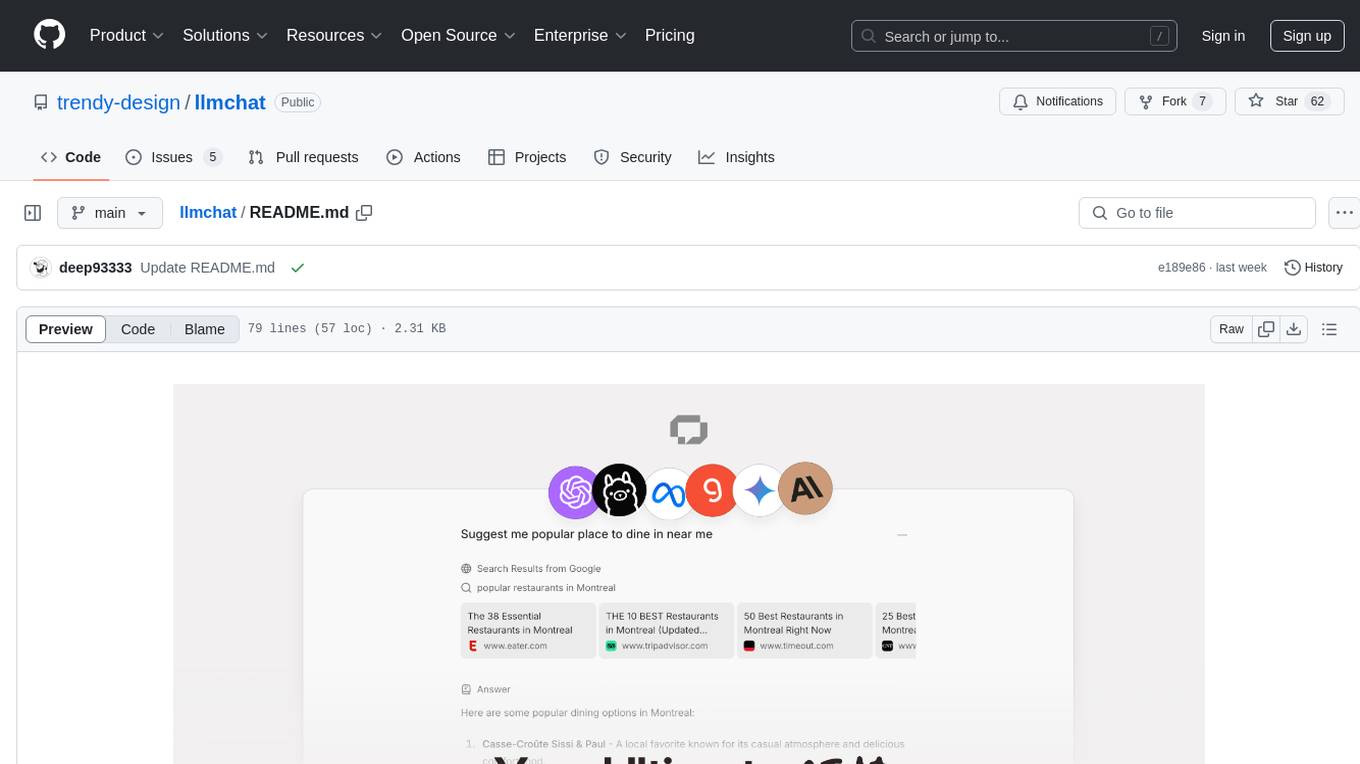
llmchat
LLMChat is an all-in-one AI chat interface that supports multiple language models, offers a plugin library for enhanced functionality, enables web search capabilities, allows customization of AI assistants, provides text-to-speech conversion, ensures secure local data storage, and facilitates data import/export. It also includes features like knowledge spaces, prompt library, personalization, and can be installed as a Progressive Web App (PWA). The tech stack includes Next.js, TypeScript, Pglite, LangChain, Zustand, React Query, Supabase, Tailwind CSS, Framer Motion, Shadcn, and Tiptap. The roadmap includes upcoming features like speech-to-text and knowledge spaces.
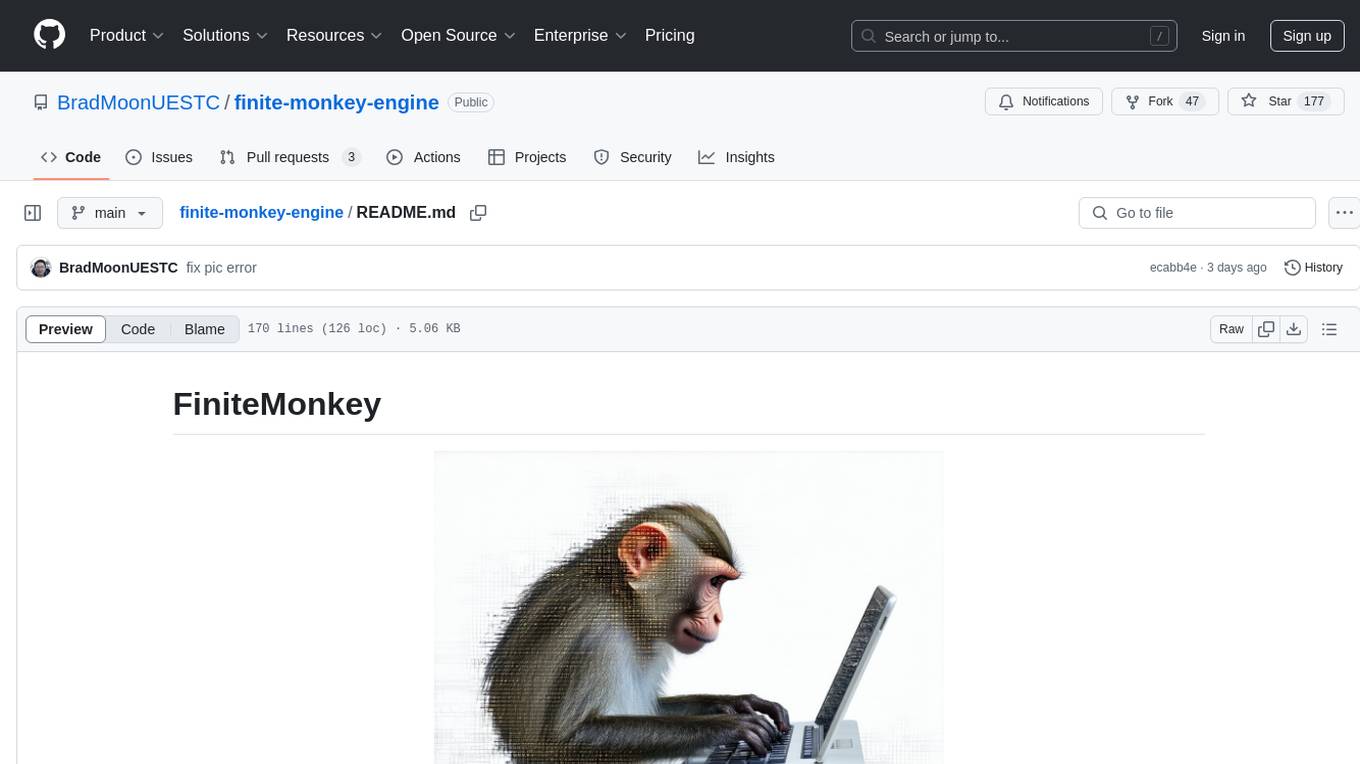
finite-monkey-engine
FiniteMonkey is an advanced vulnerability mining engine powered purely by GPT, requiring no prior knowledge base or fine-tuning. Its effectiveness significantly surpasses most current related research approaches. The tool is task-driven, prompt-driven, and focuses on prompt design, leveraging 'deception' and hallucination as key mechanics. It has helped identify vulnerabilities worth over $60,000 in bounties. The tool requires PostgreSQL database, OpenAI API access, and Python environment for setup. It supports various languages like Solidity, Rust, Python, Move, Cairo, Tact, Func, Java, and Fake Solidity for scanning. FiniteMonkey is best suited for logic vulnerability mining in real projects, not recommended for academic vulnerability testing. GPT-4-turbo is recommended for optimal results with an average scan time of 2-3 hours for medium projects. The tool provides detailed scanning results guide and implementation tips for users.
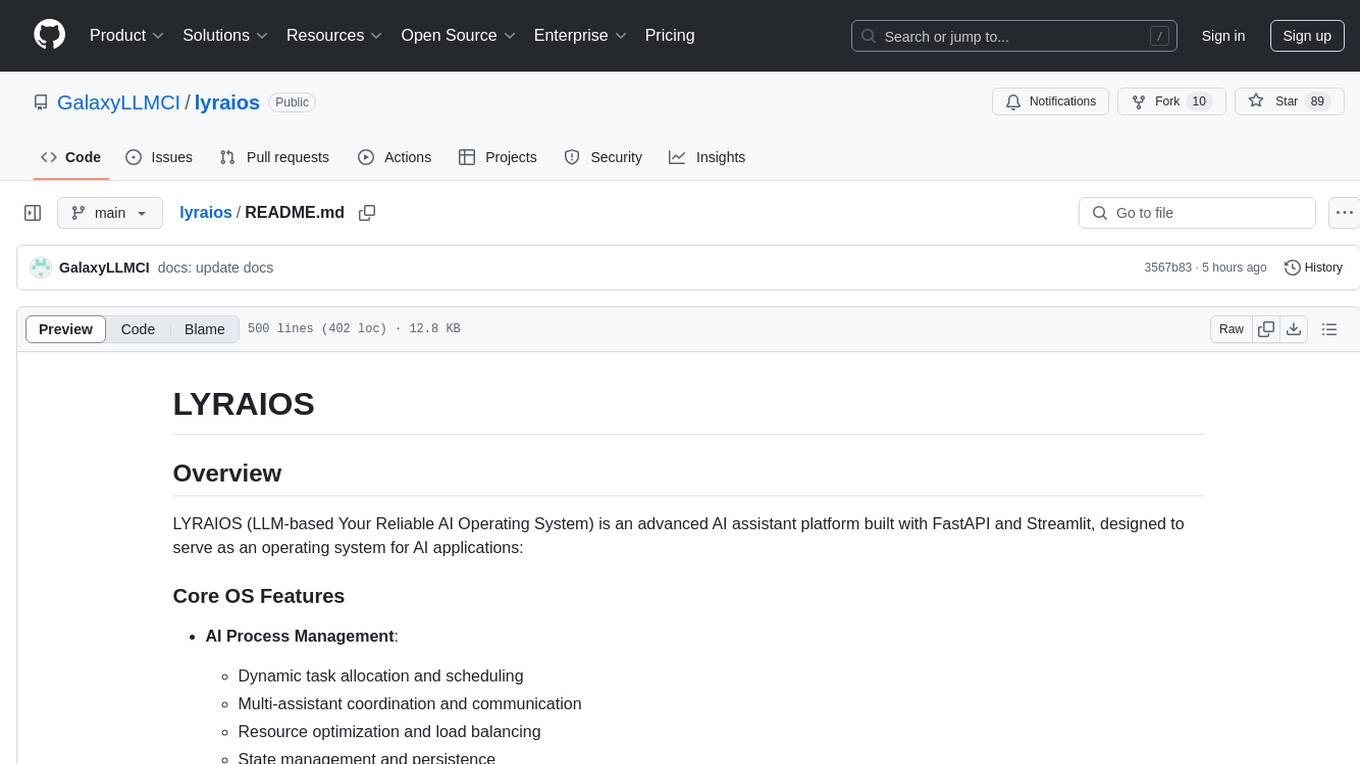
lyraios
LYRAIOS (LLM-based Your Reliable AI Operating System) is an advanced AI assistant platform built with FastAPI and Streamlit, designed to serve as an operating system for AI applications. It offers core features such as AI process management, memory system, and I/O system. The platform includes built-in tools like Calculator, Web Search, Financial Analysis, File Management, and Research Tools. It also provides specialized assistant teams for Python and research tasks. LYRAIOS is built on a technical architecture comprising FastAPI backend, Streamlit frontend, Vector Database, PostgreSQL storage, and Docker support. It offers features like knowledge management, process control, and security & access control. The roadmap includes enhancements in core platform, AI process management, memory system, tools & integrations, security & access control, open protocol architecture, multi-agent collaboration, and cross-platform support.
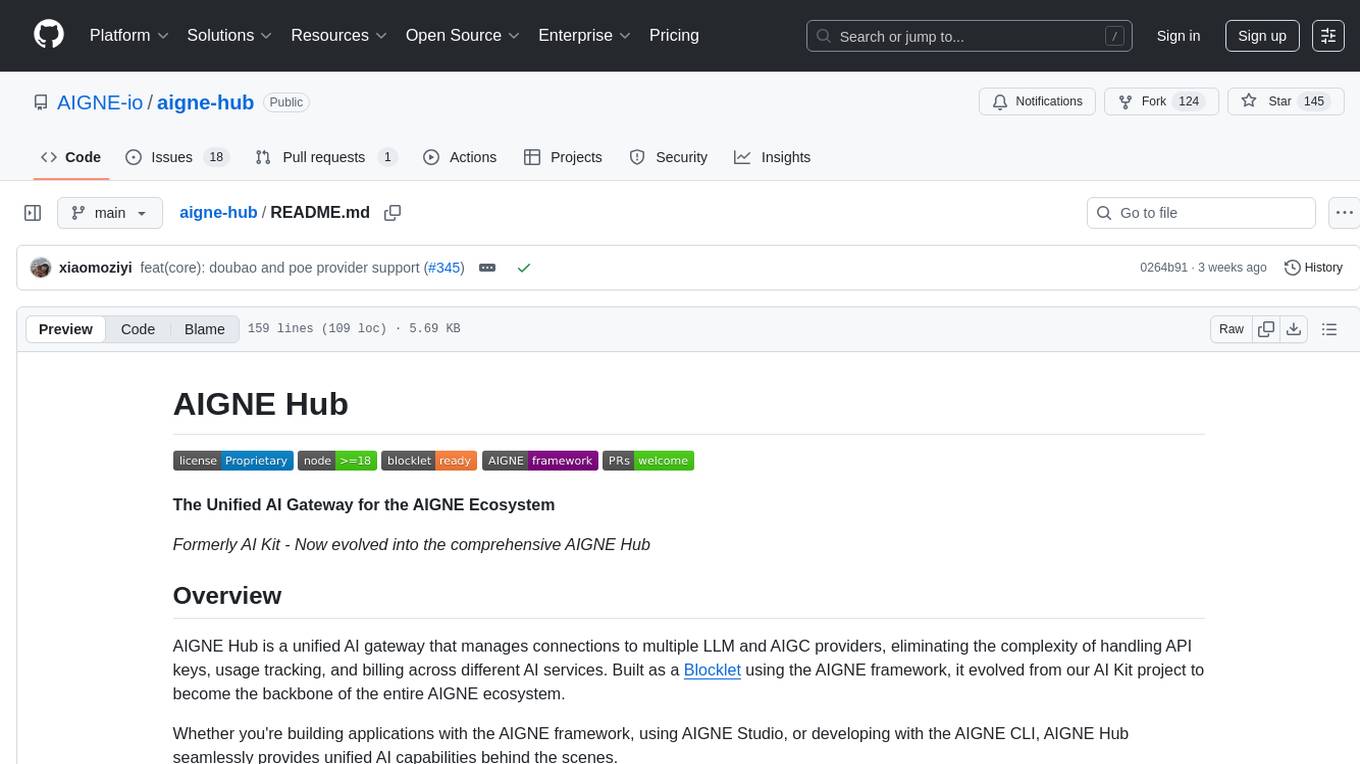
aigne-hub
AIGNE Hub is a unified AI gateway that manages connections to multiple LLM and AIGC providers, eliminating the complexity of handling API keys, usage tracking, and billing across different AI services. It provides self-hosting capabilities, multi-provider management, unified security, usage analytics, flexible billing, and seamless integration with the AIGNE framework. The tool supports various AI providers and deployment scenarios, catering to both enterprise self-hosting and service provider modes. Users can easily deploy and configure AI providers, enable billing, and utilize core capabilities such as chat completions, image generation, embeddings, and RESTful APIs. AIGNE Hub ensures secure access, encrypted API key management, user permissions, and audit logging. Built with modern technologies like AIGNE Framework, Node.js, TypeScript, React, SQLite, and Blocklet for cloud-native deployment.
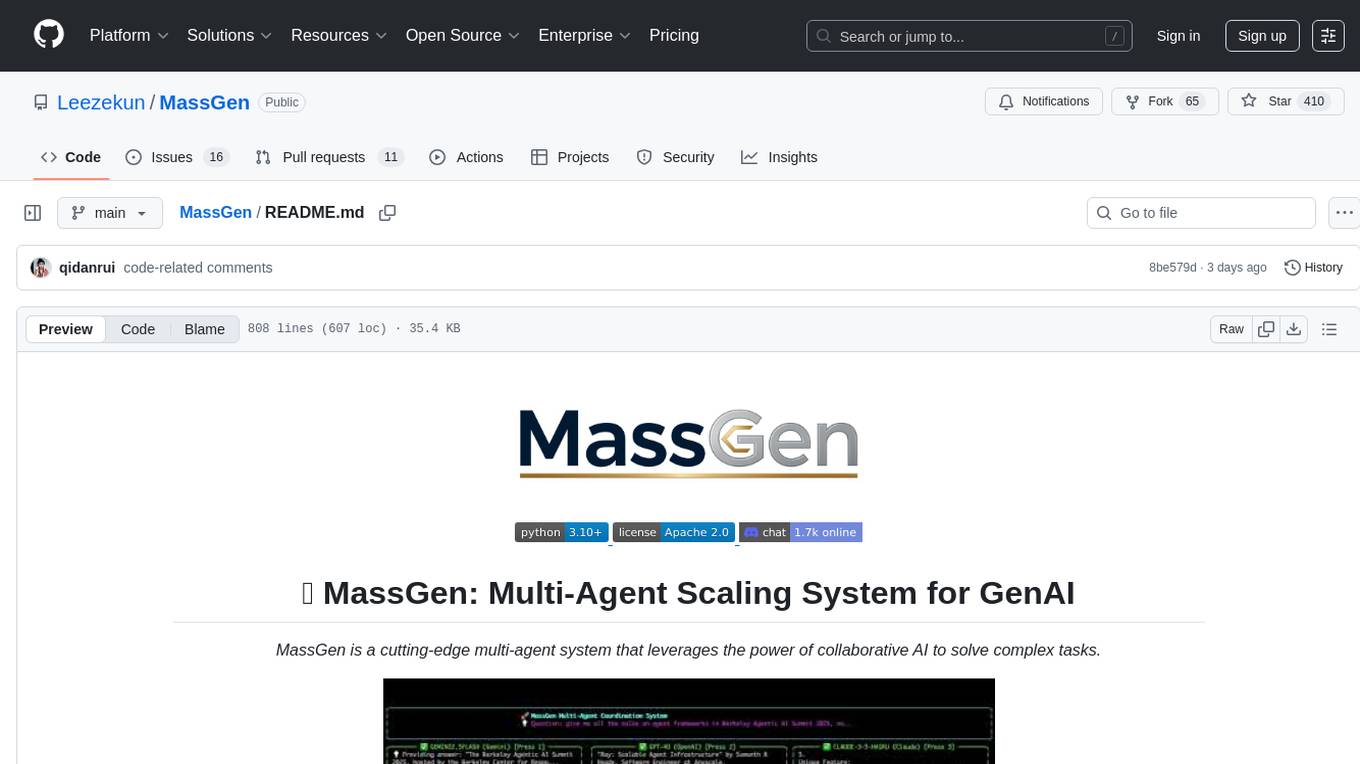
MassGen
MassGen is a cutting-edge multi-agent system that leverages the power of collaborative AI to solve complex tasks. It assigns a task to multiple AI agents who work in parallel, observe each other's progress, and refine their approaches to converge on the best solution to deliver a comprehensive and high-quality result. The system operates through an architecture designed for seamless multi-agent collaboration, with key features including cross-model/agent synergy, parallel processing, intelligence sharing, consensus building, and live visualization. Users can install the system, configure API settings, and run MassGen for various tasks such as question answering, creative writing, research, development & coding tasks, and web automation & browser tasks. The roadmap includes plans for advanced agent collaboration, expanded model, tool & agent integration, improved performance & scalability, enhanced developer experience, and a web interface.
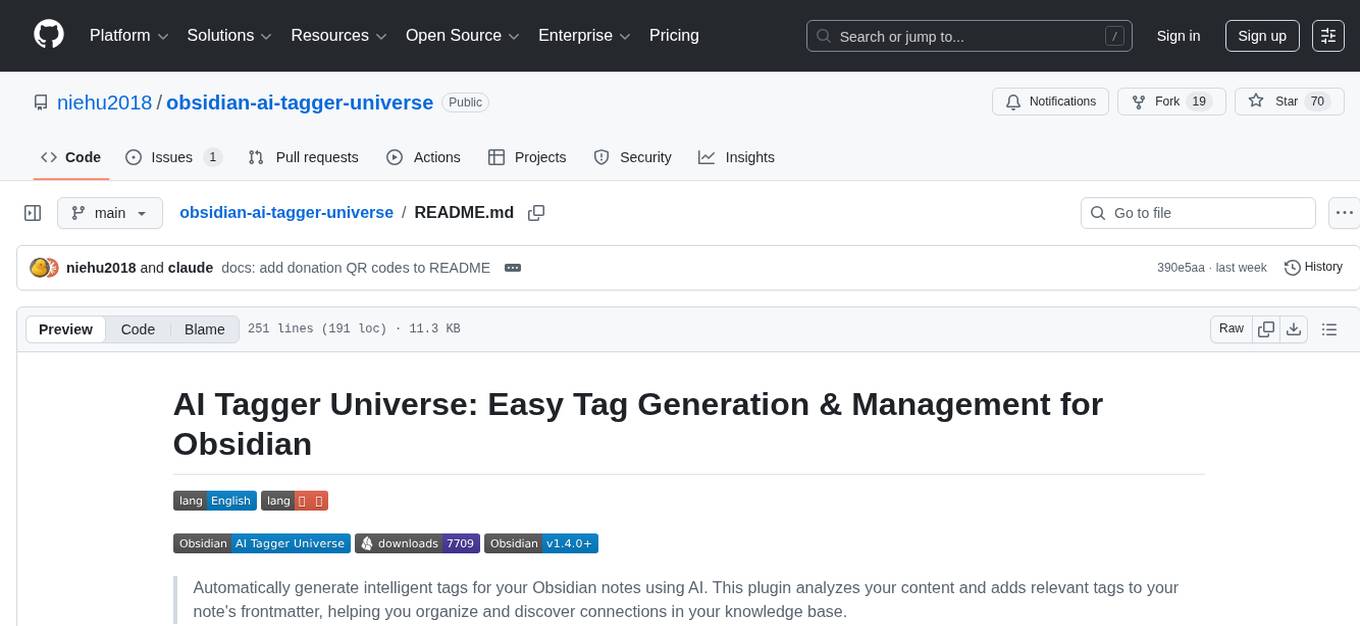
obsidian-ai-tagger-universe
AI Tagger Universe is a plugin for Obsidian that automatically generates intelligent tags for notes using AI. It offers flexible AI integration with various services, smart tagging system with multiple modes, tag network visualization, advanced management features, and support for multiple languages. Users can easily install the plugin, configure AI providers, generate tags, and visualize tag relationships. The plugin also supports nested tags, hierarchical tag generation, and tag format options. It includes bug fixes, major features, improvements, and language support for English and Chinese interfaces.
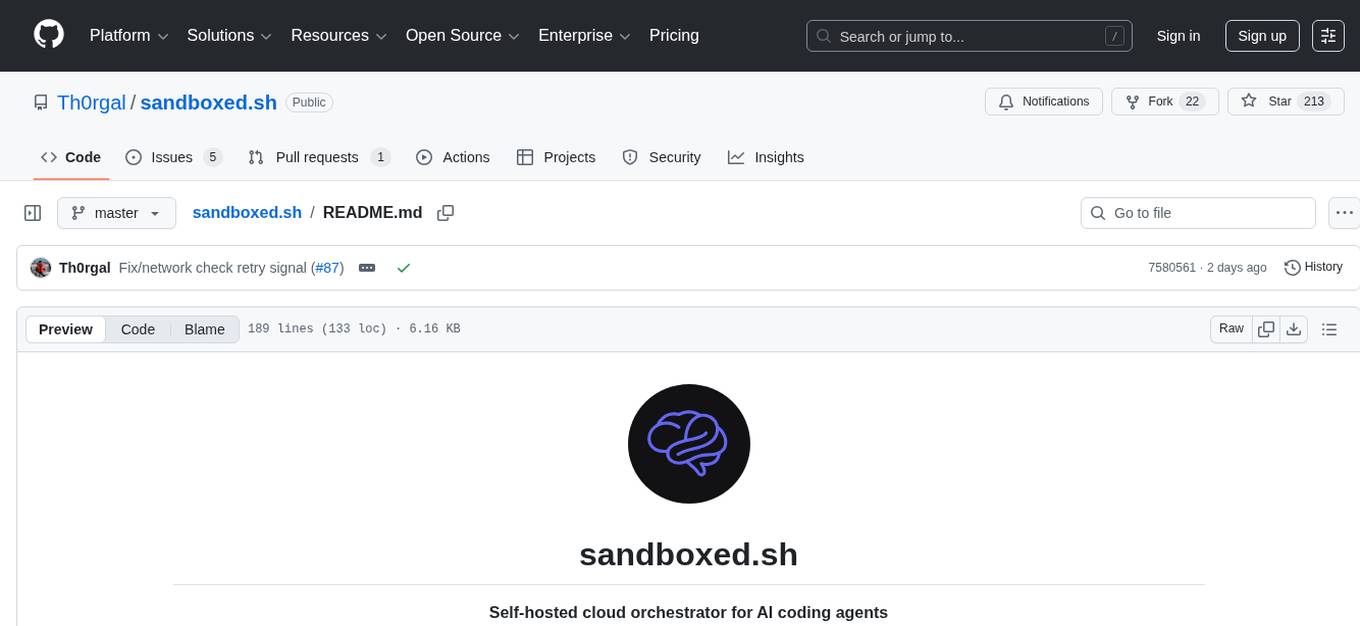
sandboxed.sh
sandboxed.sh is a self-hosted cloud orchestrator for AI coding agents that provides isolated Linux workspaces with Claude Code, OpenCode & Amp runtimes. It allows users to hand off entire development cycles, run multi-day operations unattended, and keep sensitive data local by analyzing data against scientific literature. The tool features dual runtime support, mission control for remote agent management, isolated workspaces, a git-backed library, MCP registry, and multi-platform support with a web dashboard and iOS app.
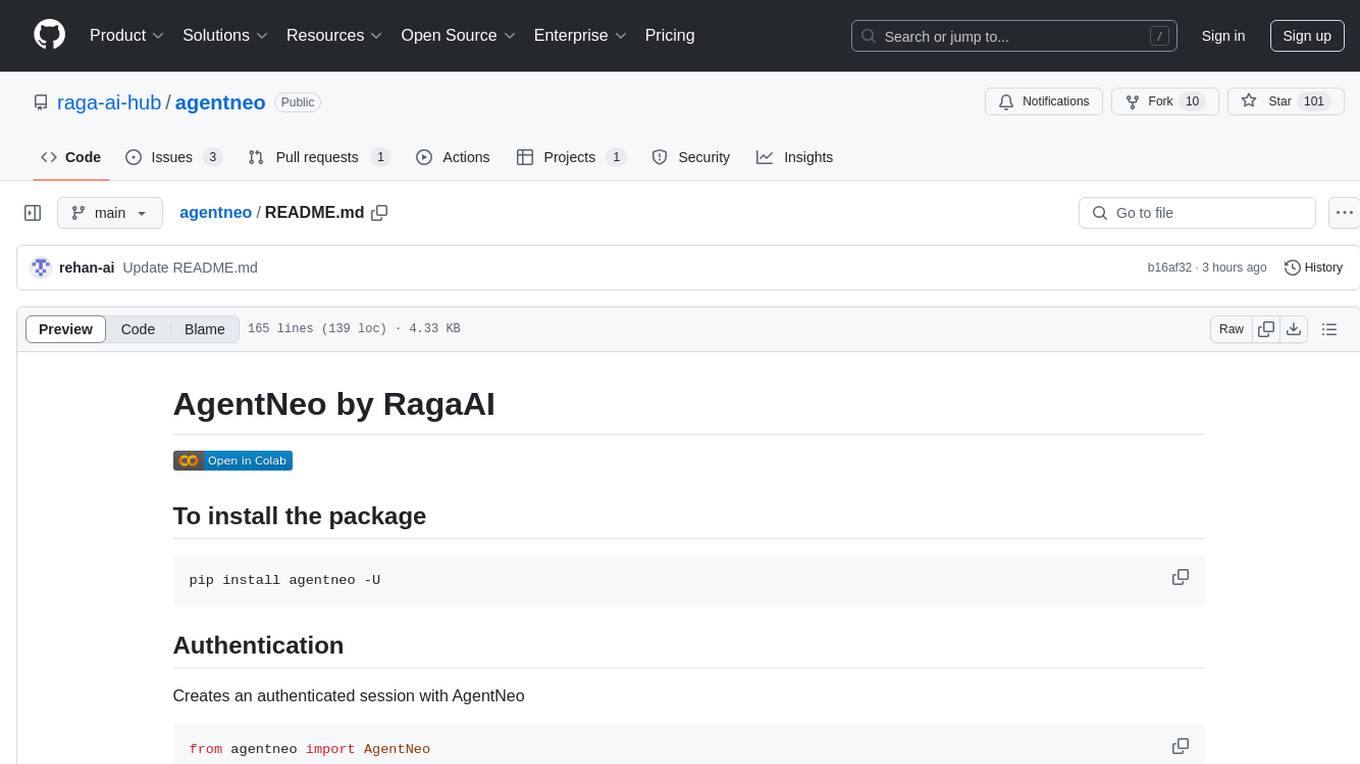
agentneo
AgentNeo is a Python package that provides functionalities for project, trace, dataset, experiment management. It allows users to authenticate, create projects, trace agents and LangGraph graphs, manage datasets, and run experiments with metrics. The tool aims to streamline AI project management and analysis by offering a comprehensive set of features.
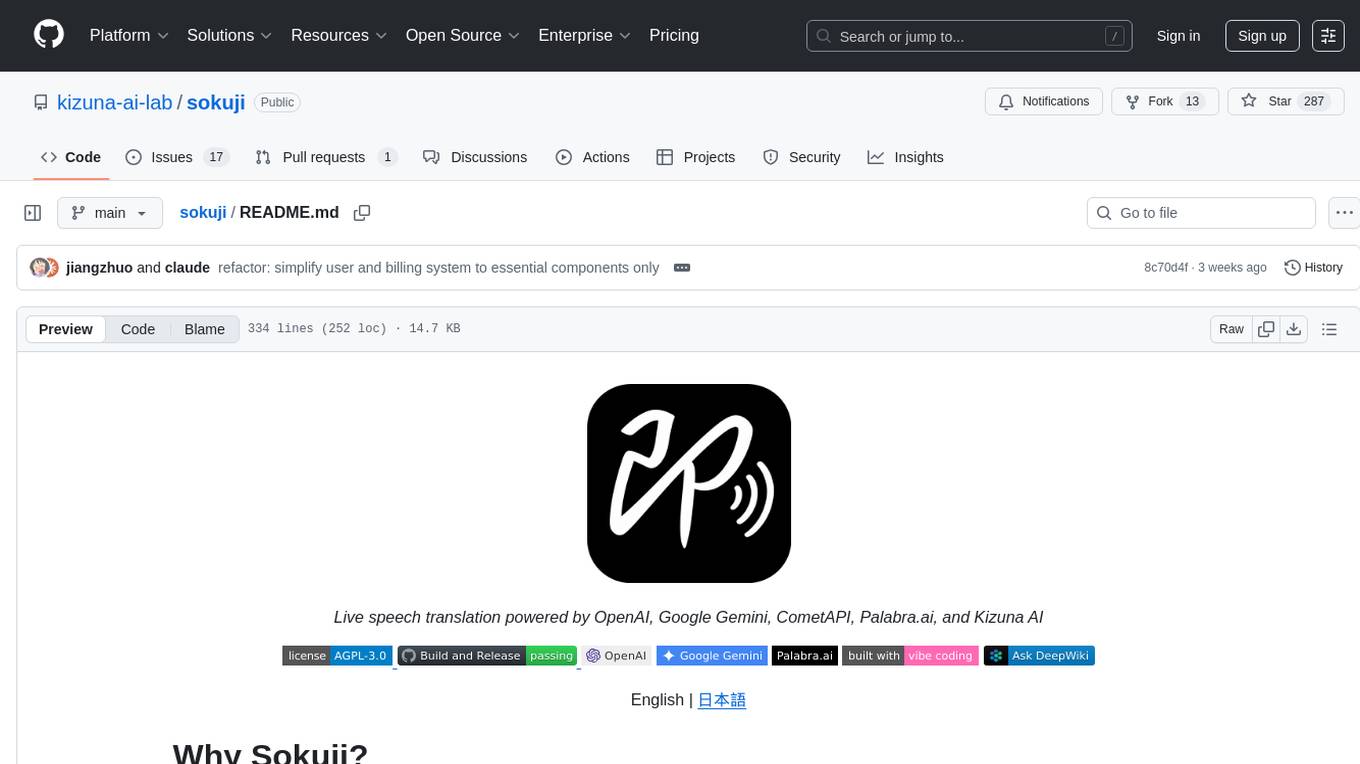
sokuji
Sokuji is a desktop application that provides live speech translation using advanced AI models from OpenAI, Google Gemini, CometAPI, Palabra.ai, and Kizuna AI. It aims to bridge language barriers in live conversations by capturing audio input, processing it through AI models, and delivering real-time translated output. The tool goes beyond basic translation by offering audio routing solutions with virtual device management (Linux only) for seamless integration with other applications. It features a modern interface with real-time audio visualization, comprehensive logging, and support for multiple AI providers and models.
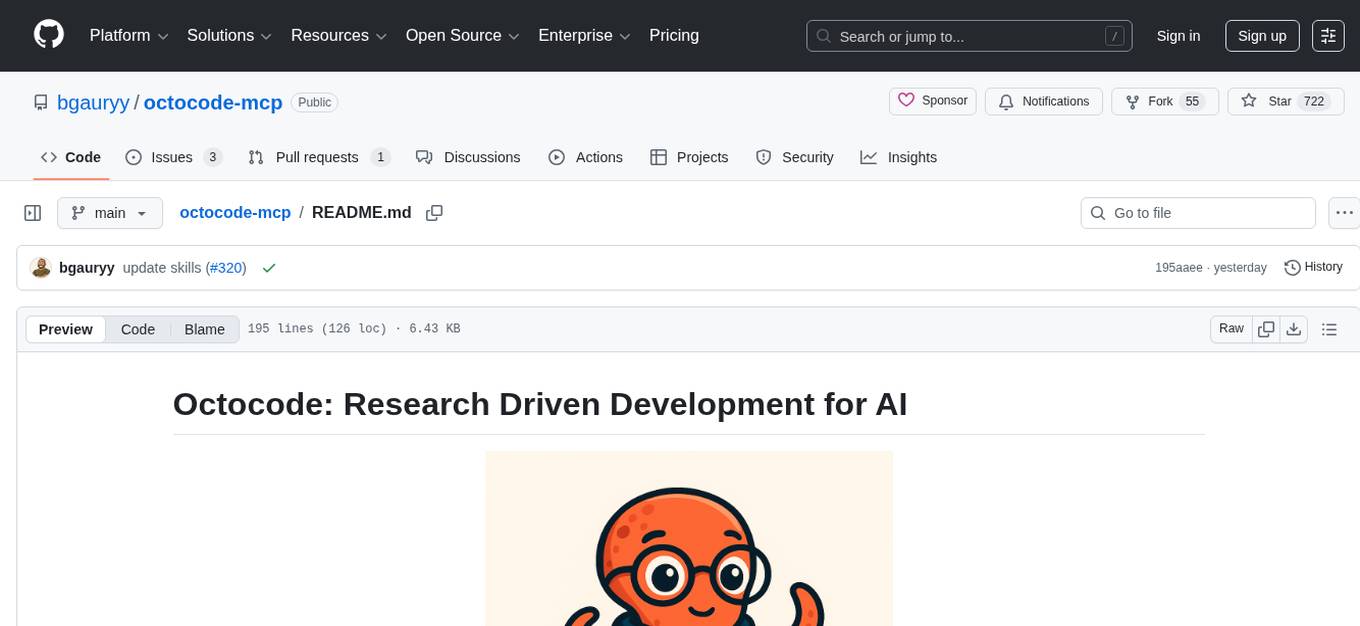
octocode-mcp
Octocode is a methodology and platform that empowers AI assistants with the skills of a Senior Staff Engineer. It transforms how AI interacts with code by moving from 'guessing' based on training data to 'knowing' based on deep, evidence-based research. The ecosystem includes the Manifest for Research Driven Development, the MCP Server for code interaction, Agent Skills for extending AI capabilities, a CLI for managing agent capabilities, and comprehensive documentation covering installation, core concepts, tutorials, and reference materials.
For similar tasks

persistent-ai-memory
Persistent AI Memory System is a comprehensive tool that offers persistent, searchable storage for AI assistants. It includes features like conversation tracking, MCP tool call logging, and intelligent scheduling. The system supports multiple databases, provides enhanced memory management, and offers various tools for memory operations, schedule management, and system health checks. It also integrates with various platforms like LM Studio, VS Code, Koboldcpp, Ollama, and more. The system is designed to be modular, platform-agnostic, and scalable, allowing users to handle large conversation histories efficiently.
For similar jobs

promptflow
**Prompt flow** is a suite of development tools designed to streamline the end-to-end development cycle of LLM-based AI applications, from ideation, prototyping, testing, evaluation to production deployment and monitoring. It makes prompt engineering much easier and enables you to build LLM apps with production quality.

deepeval
DeepEval is a simple-to-use, open-source LLM evaluation framework specialized for unit testing LLM outputs. It incorporates various metrics such as G-Eval, hallucination, answer relevancy, RAGAS, etc., and runs locally on your machine for evaluation. It provides a wide range of ready-to-use evaluation metrics, allows for creating custom metrics, integrates with any CI/CD environment, and enables benchmarking LLMs on popular benchmarks. DeepEval is designed for evaluating RAG and fine-tuning applications, helping users optimize hyperparameters, prevent prompt drifting, and transition from OpenAI to hosting their own Llama2 with confidence.

MegaDetector
MegaDetector is an AI model that identifies animals, people, and vehicles in camera trap images (which also makes it useful for eliminating blank images). This model is trained on several million images from a variety of ecosystems. MegaDetector is just one of many tools that aims to make conservation biologists more efficient with AI. If you want to learn about other ways to use AI to accelerate camera trap workflows, check out our of the field, affectionately titled "Everything I know about machine learning and camera traps".

leapfrogai
LeapfrogAI is a self-hosted AI platform designed to be deployed in air-gapped resource-constrained environments. It brings sophisticated AI solutions to these environments by hosting all the necessary components of an AI stack, including vector databases, model backends, API, and UI. LeapfrogAI's API closely matches that of OpenAI, allowing tools built for OpenAI/ChatGPT to function seamlessly with a LeapfrogAI backend. It provides several backends for various use cases, including llama-cpp-python, whisper, text-embeddings, and vllm. LeapfrogAI leverages Chainguard's apko to harden base python images, ensuring the latest supported Python versions are used by the other components of the stack. The LeapfrogAI SDK provides a standard set of protobuffs and python utilities for implementing backends and gRPC. LeapfrogAI offers UI options for common use-cases like chat, summarization, and transcription. It can be deployed and run locally via UDS and Kubernetes, built out using Zarf packages. LeapfrogAI is supported by a community of users and contributors, including Defense Unicorns, Beast Code, Chainguard, Exovera, Hypergiant, Pulze, SOSi, United States Navy, United States Air Force, and United States Space Force.

llava-docker
This Docker image for LLaVA (Large Language and Vision Assistant) provides a convenient way to run LLaVA locally or on RunPod. LLaVA is a powerful AI tool that combines natural language processing and computer vision capabilities. With this Docker image, you can easily access LLaVA's functionalities for various tasks, including image captioning, visual question answering, text summarization, and more. The image comes pre-installed with LLaVA v1.2.0, Torch 2.1.2, xformers 0.0.23.post1, and other necessary dependencies. You can customize the model used by setting the MODEL environment variable. The image also includes a Jupyter Lab environment for interactive development and exploration. Overall, this Docker image offers a comprehensive and user-friendly platform for leveraging LLaVA's capabilities.

carrot
The 'carrot' repository on GitHub provides a list of free and user-friendly ChatGPT mirror sites for easy access. The repository includes sponsored sites offering various GPT models and services. Users can find and share sites, report errors, and access stable and recommended sites for ChatGPT usage. The repository also includes a detailed list of ChatGPT sites, their features, and accessibility options, making it a valuable resource for ChatGPT users seeking free and unlimited GPT services.

TrustLLM
TrustLLM is a comprehensive study of trustworthiness in LLMs, including principles for different dimensions of trustworthiness, established benchmark, evaluation, and analysis of trustworthiness for mainstream LLMs, and discussion of open challenges and future directions. Specifically, we first propose a set of principles for trustworthy LLMs that span eight different dimensions. Based on these principles, we further establish a benchmark across six dimensions including truthfulness, safety, fairness, robustness, privacy, and machine ethics. We then present a study evaluating 16 mainstream LLMs in TrustLLM, consisting of over 30 datasets. The document explains how to use the trustllm python package to help you assess the performance of your LLM in trustworthiness more quickly. For more details about TrustLLM, please refer to project website.

AI-YinMei
AI-YinMei is an AI virtual anchor Vtuber development tool (N card version). It supports fastgpt knowledge base chat dialogue, a complete set of solutions for LLM large language models: [fastgpt] + [one-api] + [Xinference], supports docking bilibili live broadcast barrage reply and entering live broadcast welcome speech, supports Microsoft edge-tts speech synthesis, supports Bert-VITS2 speech synthesis, supports GPT-SoVITS speech synthesis, supports expression control Vtuber Studio, supports painting stable-diffusion-webui output OBS live broadcast room, supports painting picture pornography public-NSFW-y-distinguish, supports search and image search service duckduckgo (requires magic Internet access), supports image search service Baidu image search (no magic Internet access), supports AI reply chat box [html plug-in], supports AI singing Auto-Convert-Music, supports playlist [html plug-in], supports dancing function, supports expression video playback, supports head touching action, supports gift smashing action, supports singing automatic start dancing function, chat and singing automatic cycle swing action, supports multi scene switching, background music switching, day and night automatic switching scene, supports open singing and painting, let AI automatically judge the content.

